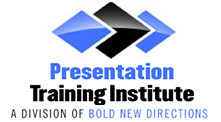Not Preparing Enough
You may assume that since you know your topic like the back of your hand that you don’t need to spend as much time preparing for your presentation. Wrong! In your mind’s eye you may think you have the whole presentation worked out, but when it comes time to actually present it, you find yourself panicking because you underestimated the task. Pulling off a good presentation takes adequate preparation. Do your due diligence, know your topic, spend time creating a meaningful presentation, and rehearse it several times. Preparation is the key to delivering a successful presentation.Â
Not Focusing on Your Audience
Oftentimes presenters get so wrapped up in their topic and the delivery of their presentation that they forget about the needs of their audience. The whole point of your presentation is to provide something beneficial for the audience, so it only makes sense that you need to learn about them before you arrive. Take some time to find out who your audience is, what their background knowledge on the topic is, and what they hope to gain from your presentation. Then, you can tailor your presentation to meet their needs.Â
Too Much Text on Slides
There is nothing more annoying to an audience than having to read paragraphs on every slide. Slideshows can be a great way to enhance your presentation, but they are intended to do just that. Every piece of information should never be included on your slides. Cramming too much information on a slideshow will almost certainly guarantee you lose audience interest. Furthermore, if your audience is busy reading all of that text, they won’t be listening to you. Keep your slideshows simple and remember that less is always more.Â
Reading from a Slideshow
The only thing worse than expecting your audience to read all of your slides is for you to read it to them. Again, keep your slides simple with less text, meaningful images, and visuals that supplement what you are saying. People are there to listen to you speak, NOT to hear you read from slides.Â
Rambling or Using Too Much Jargon
Most people aren’t super excited about attending a presentation, so be respectful of people’s time. Don’t spend an hour talking if you can get your point across in 20 minutes. Likewise, be mindful of your audience and avoid using too much jargon or too many technical terms. It’s difficult to pay attention to someone when you have no idea what they are talking about.Â
Trying to Cram Too Much Information
Before preparing your presentation, ask yourself: “What is the main purpose of my presentation and what do I want my audience to take away from it?â€. Narrowing your presentation down to one main point can help you eliminate unnecessary information so you aren’t cramming too much information into your presentation. You don’t want to overwhelm your audience, but rather leave them with a few memorable points and a call to action.Â
Not Familiarizing Yourself with the Venue and Equipment
Imagine your presentation begins in an hour and when you arrive at the venue to set up, the projector won’t work with your laptop. All of those slides that you have been preparing for weeks are useless and you only have moments to improvise. You can avoid this situation by checking out the venue and available equipment ahead of time. Familiarize yourself with the space and all of the technical equipment so you can identify potential issues and come up with a plan B if needed.
